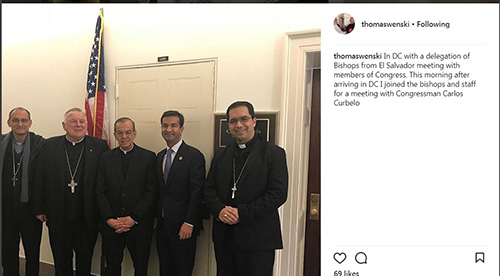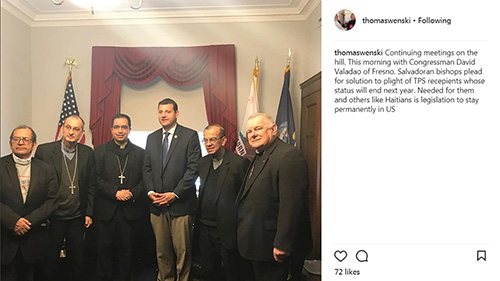By Archbishop Thomas Wenski - The Archdiocese of Miami
Cardinal Gregorio Rosa Chávez, auxiliary bishop of San Salvador, and Archbishop Thomas Wenski of Miami, issued this column the same week they, as part of a delegation of Salvadoran and U.S. bishops, met with Congressional leaders in Washington, D.C., to urge legal protection for nearly 200,000 Salvadorans living in the U.S. President Donald Trump ended TPS - Temporary Protective Status - for Salvadorans in January, and they are now threatened with deportation. The bishops' meetings took place April 12 and 13, 2018.

Photographer: Instagram
ArchbishopThomas Wenski posted these photos on his Instagram account after the meetings in Washington, D.C., between Salvadoran and U.S. bishops and Congressional representatives.
In 2001, in a spirit of solidarity with Ecuador where the devastation from two earthquakes made life unlivable for many of its citizens, the United States created and passed with bipartisan support the Temporary Protective Status program (or TPS). Started in 1990, the program was established to protect migrants and refugees fleeing war, persecution, natural disasters and poverty. TPS has allowed some 200,000 Salvadorans to live and work in the U.S.With the U.S. government’s decision to end the vital humanitarian relief program that is TPS, those currently living in the U.S. � the majority of whom are wonderful people and many of them parents to some 192,000 U.S.-born children � face being sent back to a country some of them barely know. After years of working to build a life here, “home” is no longer “there;” “home” is “here.” Faced with deportation, they are worried about their future and children’s future.
Sadly, they are right to be. The reality of El Salvador today is a painful one. Caught between poverty, gang violence and organized crime, the country is one of the world’s five most violent. Gangs control entire neighborhoods. They extort businesses and recruit impoverished and vulnerable youth with join-or-die policies that terrorize families and often keep children from going to school.
Sending people back to that is not just wrong, it is cruel. “Deportees” will undoubtedly stand out and be targeted by gangs for extortion or worse because the gangs will think they have money. Those hoping to take their hard-earned entrepreneurship skills honed in the U.S. back to El Salvador will soon be targeted by criminal gangs, who daily extort businesses with the threat of violence
With high rates of unemployment, the El Salvadoran society simply doesn’t have the capacity to receive and properly integrate that many people. Sending people back will further exasperate the root causes of poverty, violence, and inequality that perpetuate forced migration out of the country. And the loss of remittances sent to relatives by TPS recipients in the U.S. will make a difficult economic situation even worse.
The U.S. government supports the Alliance for Prosperity and Security in El Salvador and neighboring Honduras and Guatemala, which addresses rampant violence and slow economic growth�the two biggest factors for migration from the region. A sudden influx of two hundred thousand people now would only further destabilize the region’s already tenuous situation, reversing any progress of development in the region and bringing its infrastructure to a breaking point.
As a Church we will continue to work together, as we have for years, to address the root causes that force Salvadorans to seek safety and a better life in the U.S. in the first place. With the international community, we should invest more in violence prevention and youth development.
The U.S. Catholic Church, through Catholic Relief Services, is seeing the results of programs that help at-risk youth find jobs, go back to school, and develop life and leadership skills. We applaud Congress for protecting development assistance that make these programs possible and encourage Congress to continue to fund them.
Meanwhile, ending TPS will tear families apart. As Catholics, we find that unconscionable. The family is the sacred building block of societies. Salvadoran TPS holders deserve to live lives of dignity and not face devastating family separation. They merit our compassion and respect for the contributions that they have made to the U.S. and the lives they have made here.
This week, we’re meeting with members of Congress to urge them to find a permanent legislative solution that protects contributing TPS recipients who have lived here many years and their families. As pastors in a united Church, we cannot remain silent amid the drama and panic playing out for these families.


